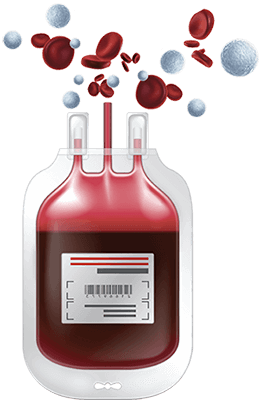Canada's Largest & Oldest Cord Blood Bank
Congratulations and welcome to motherhood. Your newborn will be getting used to his or her life outside the womb this month.
Newborn Development
Your newborn may still have some left over languo (the fine hairs that helped him or her regulate body temperature in utero). If your newborn is preterm, you may even notice some remnants of the waxy coating (vernix) that used to cover the skin. You may notice that the skin is peeling a little or is splotched. He or she will remain curled in the fetal position and likely prefer being bundled or swaddled, because it resembles being inside your belly.
How big is your newborn? The average birth weight of newborn should be around 7.5 pounds (3.5 kilograms). Anywhere between 5.5 pounds (2.5 kilograms) to 10 pounds (4.5 kilograms) is considered normal. Your baby will lose 5% to 10% of his or her body weight right after delivery. This is normal since they lose extra fluids. He or she will put this weight back on within 2 weeks if you are breastfeeding or a bit earlier if formula-fed.

Around 60% of newborns develop jaundice, a yellow tinge skin, around 2 to 3 days after birth. This is because the liver of most babies takes longer to clear bilirubin, a pigment made when red blood cells breakdown. It is recommended the bilirubin levels are tested between 24 to 72 hours after birth. Most of the time, jaundice clears on its own.
You will also experience the joy of changing your first diaper and notice the greenish meconium produced when your baby’s digestive system processed the languo and vernix that was shed before birth.
Your healthcare provider will request that you record your baby’s feeding, peeing and bowel movements for the first few weeks. The goal is to ensure that all of your baby’s systems are fully functional.
Newborn Screening
Your newborn will be examined several times in the first few hours of his or her life. Immediately after birth, your healthcare provider will give your baby an APGAR assessment, which looks at several things like breathing, heart rate, muscle tone and reflexes. This is assessment is done to ensure that your baby does not require additional medical support to get started. Your baby will likely receive a vitamin K shot to boost his clotting system and eye ointments to prevent infections.
Newborn screening will be done 24 to 72 hours after birth using a heel prick blood test. The healthcare provider will prick your baby’s heel and take a small amount of blood, which will be tested for, phenylketonuria (an enzyme deficiency), hypothyroidism (thyroid hormone deficiency), and between 5 to 30 inherited conditions. The number of conditions tested will depend on where you are located. A blood sample will also be collected to test bilirubin levels, which is responsible for jaundice.

Baby Tip
Even if you have opted for cloth diapering, we recommend using disposable diapers for the first few bowel movements, as meconium may be extremely difficult to clean.

At the Cutting Edge
If you’ve made the choice to protect your baby’s future by banking stem cells. Don’t stop there! Stem cell research is advancing at an unprecedented pace due to their tremendous potential. Keep up to date with latest advances in stem cell banking technologies, research and development with the following resources →.
Supporting Your Baby
Sleep
It is very likely your baby will spend most of these initial few weeks eating and sleeping. Until about 3 or 4 months, your baby will sleep between 14 to 17 hours in a 24-hour period. He or she will probably only wake up to eat, every 2 to 4 hours. You may not have the luxury of getting a full night of sleep for months but try to rest as much as possible while the baby is sleeping. If you are breastfeeding, remember to eat a healthy, well balanced diet to make sure your supply is maintained.
Feeding
You may often worry about whether your baby is getting enough milk the first few days. At this stage, your baby should be feeding every 2 to 3 hours (or 8 times a day). If you are breastfeeding, your baby will likely feed from anywhere between 15 minutes to 20 minutes.

Breastfeeding come naturally to some moms, while others may take a bit longer to adapt. If you have chosen to breastfeed your baby, keep in mind that it may take time to get the hang of it. There are many benefits to breastfeeding including the precious antibodies that are transferred to your baby through breast milk, bonding with your baby and reducing your baby’s risk of sudden infant death syndrome. Breastfeeding also helps the mom, as the extra calories used to produce milk will help you get back to your pre-pregnancy weight faster.
With formula, your little one needs about 2 to 3 ounces every 3 to 4 hours.
Bowel movements
If you are worried about whether your baby is eating enough, you can keep track of your baby’s bowel movements. You will see a colour change in the poo the bowel movements change to yellow when are feeding enough. If you are still concerned, talk to your healthcare provider about how often to breast- or bottle-feed. Additionally, your baby should be wetting about 5 to 8 diapers a day. You will want to keep track of urine and bowel movements for the first few weeks.
Stem Cell Research is One of the Fastest Growing Areas of Study.
Over 1000 Clinical Trials Underway. Research and clinical trials are expanding the list of life-threatening disease that may be treated with stem cells in the future. With rapid advances in stem cell research, treatment methods using cord blood and cord tissue stem cells in cell therapies will continue to expand during a child’s lifetime. Learn more →





